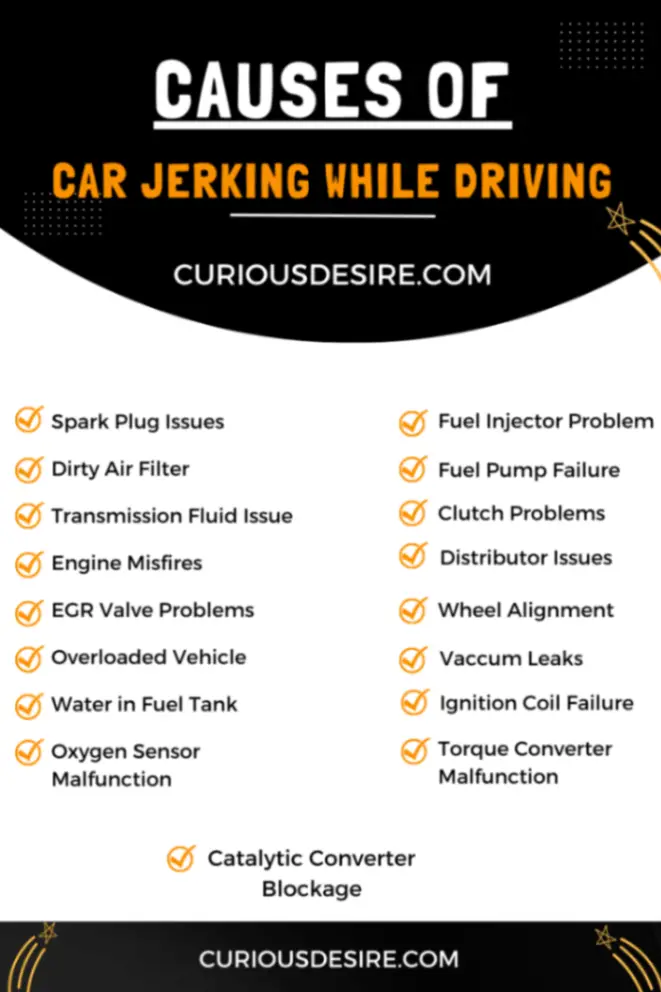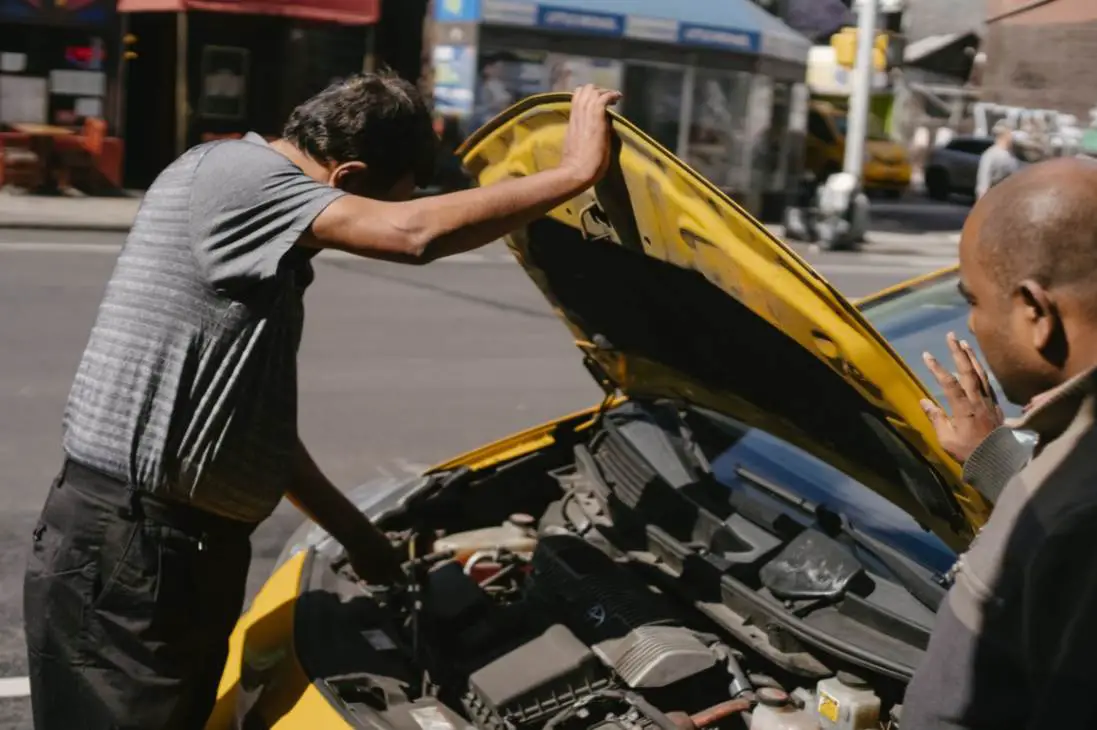Have you ever experienced the unsettling sensation of your car jerking unexpectedly while cruising down the road?
It’s a disconcerting feeling that can leave drivers feeling anxious and frustrated.
Understanding the potential causes behind this phenomenon is crucial for maintaining your vehicle’s performance and safety on the road.
In this comprehensive blog, we’ll delve into the common reasons why cars jerk while driving.
5 most common causes of car jerking while driving:
- Spark Plug Issues
- Dirty Air Filter
- Fuel Pump Failure
- Overloaded Vehicle
- Ignition Coil Failure

1. Spark Plug Issues
Spark plugs play a vital role in igniting the air-fuel mixture within the engine’s cylinders.
Over time, spark plugs can become worn out or fouled with deposits, which can lead to inconsistent ignition and misfires.
When spark plugs fail to ignite the air-fuel mixture properly, it can result in engine hesitation and jerking sensations while driving.
Replacing worn-out spark plugs at regular intervals, as recommended by your vehicle manufacturer, can help maintain smooth engine operation and prevent jerking.
2. Fuel Injector Problems
Fuel injectors are responsible for delivering precise amounts of fuel into the engine cylinders for combustion.
When fuel injectors become clogged or malfunctioning, they may not spray fuel evenly or at the correct pressure, leading to uneven combustion and engine misfires.
This can cause the vehicle to jerk or hesitate during acceleration or cruising.
Regularly cleaning or replacing clogged fuel injectors, as well as using high-quality fuel and performing fuel system maintenance, can help prevent injector-related issues.
3. Dirty Air Filter
The air filter in your vehicle prevents dirt, dust, and debris from entering the engine’s intake system.
Over time, the air filter can become clogged with contaminants, restricting airflow to the engine.
A dirty air filter can disrupt the air-fuel mixture ratio, leading to incomplete combustion and engine performance issues, including jerking while driving.
Replacing the air filter at recommended intervals, typically every 12,000 to 15,000 miles or as specified by your vehicle manufacturer, can help ensure proper engine airflow and prevent jerking.
4. Fuel Pump Failure
The fuel pump is responsible for pumping fuel from the gas tank to the engine at the correct pressure.
When the fuel pump begins to fail or loses efficiency, it may not deliver an adequate amount of fuel to the engine, leading to fuel starvation and engine misfires.
Symptoms of fuel pump failure may include
- Jerking
- Hesitation
- Engine stalling during acceleration or at high speeds.
Replacing a failing fuel pump and ensuring proper fuel system maintenance, such as regularly replacing the fuel filter, can help prevent fuel pump-related issues and maintain smooth engine operation.
5. Transmission Fluid Issues
Transmission fluid serves as a hydraulic fluid that helps facilitate gear shifts and lubricates various components within the transmission.
If the transmission fluid level is low or if the fluid is dirty or degraded, it can lead to erratic transmission behavior, including jerking while driving.
Low fluid levels or degraded fluid can result in inadequate lubrication and increased friction within the transmission, causing gears to engage improperly or slip, resulting in jerky movements.
Regularly checking and maintaining proper transmission fluid levels, as well as performing fluid changes at recommended intervals can help prevent transmission fluid-related issues.
6. Torque Converter Malfunction
The torque converter is a fluid coupling device located between the engine and the transmission.
It allows the engine to continue running while the vehicle is stationary and helps transmit power from the engine to the transmission.
If the torque converter fails or malfunctions, it can result in various transmission problems, including jerking while driving.
Common issues with the torque converter include lock-up clutch problems, fluid leaks, or internal damage, all of which can lead to jerking sensations.
Diagnosing and repairing torque converter issues typically require the expertise of a qualified mechanic.
7. Clutch Problems
In manual transmission vehicles, the clutch is responsible for engaging and disengaging the engine from the transmission to change gears.
If the clutch components, such as the clutch disc, pressure plate, or release bearing, become worn out or damaged, it can lead to clutch slippage or engagement issues, resulting in jerky movements while driving.
Symptoms of clutch problems may include:
- Difficulty shifting gears
- Clutch chatter
- Slipping clutch pedal
Repairing clutch-related issues typically involves replacing worn-out components and adjusting the clutch linkage to ensure proper operation.

8. Engine Misfires
Engine misfires occur when one or more cylinders in the engine fail to ignite the air-fuel mixture properly.
Common causes of engine misfires include faulty spark plugs, ignition coils, fuel injectors, or engine timing problems.
When an engine misfires, it can cause the vehicle to jerk or hesitate during acceleration.
Additionally, engine misfires can lead to reduced engine performance, increased emissions, and potential damage to the catalytic converter.
Diagnosing and repairing engine misfires typically involves performing a comprehensive engine inspection and replacing faulty components as needed.
9. Oxygen Sensor Malfunction
Oxygen sensors (O2 sensors) monitor the oxygen levels in the exhaust gases and provide feedback to the engine control unit (ECU) to adjust the air-fuel mixture accordingly.
A malfunctioning oxygen sensor can send inaccurate data to the ECU, leading to improper fuel-air mixture ratios.
This can cause the engine to run rich or lean, resulting in poor combustion and engine misfires.
Car jerking, hesitation, and reduced fuel efficiency are common symptoms of oxygen sensor malfunction.
Replacing faulty oxygen sensors as recommended by your vehicle manufacturer can help restore proper engine performance and prevent jerking while driving.
10. Catalytic Converter Blockage
The catalytic converter is a critical emissions control device that converts harmful pollutants in exhaust gases into less harmful substances through chemical reactions.
Over time, catalytic converters can become clogged or restricted due to the accumulation of carbon deposits or other contaminants.
A blocked catalytic converter restricts exhaust flow, leading to increased backpressure in the exhaust system.
This can cause engine performance issues, including reduced power, hesitation, and car jerking while driving.
Addressing the root cause of the blockage, such as repairing or replacing a failing catalytic converter, is necessary to restore proper exhaust flow and engine performance.
11. Ignition Coil Failure
Ignition coils are responsible for converting the low voltage from the battery into high-voltage electrical pulses needed to ignite the air-fuel mixture in the engine cylinders.
When ignition coils fail or malfunction, they may produce weak or inconsistent sparks, leading to engine misfires and poor combustion.
Symptoms of ignition coil failure include rough idling, hesitation, and car jerking while driving, especially under load or during acceleration.
12. Distributor Issues
In older vehicles equipped with a distributor, a faulty distributor can cause erratic timing of spark plug firing.
This can lead to misfires, rough idling, and jerking movements while driving.
Problems with the distributor cap, rotor, or internal components can disrupt the ignition system’s operation, affecting engine performance.
Repairing or replacing a faulty distributor can help resolve jerking issues associated with ignition timing problems.
13. Throttle Position Sensor (TPS) Issues
The throttle position sensor (TPS) monitors the position of the throttle valve and sends signals to the engine control unit (ECU) to adjust fuel delivery and engine timing accordingly.
If the TPS malfunctions or sends inaccurate signals, it can lead to improper fuel-air mixture ratios and erratic engine performance.
Replacing a faulty TPS and ensuring proper calibration can help restore smooth engine operation.
14. EGR Valve Problems
The exhaust gas recirculation (EGR) valve is responsible for recirculating a portion of exhaust gases back into the engine’s intake system to reduce emissions and control combustion temperatures.
If the EGR valve becomes stuck open or closed, it can disrupt the air-fuel mixture ratio and engine combustion, leading to poor performance and jerking while driving.
Symptoms of EGR valve problems include
- Rough idling
- Engine hesitation
- Decreased fuel efficiency
Cleaning or replacing a faulty EGR valve can help resolve these issues and restore proper engine operation.

15. Wheel Alignment Issues
Wheel alignment refers to the angle and orientation of the wheels relative to each other and the vehicle’s frame.
Improper wheel alignment can result from factors such as hitting potholes, curbs, or other road hazards.
Misaligned wheels can cause uneven tire wear and affect vehicle stability and handling.
Symptoms of wheel alignment issues include steering wheel vibration, uneven tire wear, and steering pull.
In severe cases, misaligned wheels can lead to steering instability and car jerking while driving.
Regular wheel alignment checks and adjustments can help prevent these issues and ensure smooth and stable vehicle operation.
16. Vacuum Leaks
Vacuum leaks occur when there is an unintended gap or opening in the engine’s intake system, allowing unmetered air to enter the engine.
Common sources of vacuum leaks include cracked or disconnected vacuum hoses, leaking intake manifold gaskets, or damaged intake components.
Vacuum leaks can disrupt the air-fuel mixture ratio, leading to rough idling, engine hesitation, and jerking while driving.
Identifying and repairing vacuum leaks promptly is essential to prevent engine performance issues and maintain smooth vehicle operation.
17. Overloaded Vehicle
Overloading your vehicle beyond its recommended weight capacity can strain the engine, suspension, and braking systems, leading to poor performance and handling characteristics.
When a vehicle is overloaded, it puts excess stress on components such as the engine, transmission, and suspension, which can result in sluggish acceleration, reduced braking effectiveness, and unstable handling.
This strain on the vehicle’s systems can cause jerking sensations, particularly during acceleration or when navigating corners.
It’s essential to adhere to the manufacturer’s recommended weight limits and avoid overloading your vehicle to maintain optimal performance and safety.
18. Dirty or Contaminated Engine Oil
Engine oil plays a critical role in lubricating and protecting the engine’s internal components from wear and tear.
Over time, engine oil can become contaminated with dirt, debris, and other contaminants, reducing its effectiveness in lubricating the engine.
Dirty or contaminated engine oil can lead to increased friction and heat buildup within the engine, causing components to wear prematurely and leading to poor engine performance.
Symptoms of dirty or contaminated engine oil include rough idling, decreased engine power, and car jerking while driving.
Regular oil changes and maintenance are essential to ensure proper engine lubrication and prevent performance issues.
19. Water in the Fuel Tank
Water contamination in the fuel tank can occur due to condensation, fueling up during rainy weather, or a faulty fuel cap that allows water to enter the tank.
Water in the fuel tank can disrupt the combustion process in the engine, leading to misfires, hesitation, and rough engine performance.
Symptoms of water-contaminated fuel include sputtering, engine hesitation, and car jerking while driving, particularly under load or during acceleration.
To prevent water contamination, it’s essential to ensure proper fueling practices and maintain the integrity of the fuel system, including the fuel cap and fuel tank.
20. Faulty Traction Control System
The traction control system helps prevent wheel spin and loss of traction by modulating engine power and applying braking force to individual wheels when a slip is detected.
A faulty traction control system can malfunction and interfere with the vehicle’s ability to maintain traction, especially during acceleration or when driving on slippery surfaces.
Symptoms of a faulty traction control system include illuminated warning lights on the dashboard, loss of traction control functionality, and erratic vehicle behavior, including jerking or hesitation during acceleration.
Proper diagnosis and repair of the traction control system are necessary to ensure safe and reliable vehicle operation.
Conclusion
To sum it up, there are several potential causes of a car jerking while driving, ranging from fuel system issues to transmission problems, suspension issues, brake problems, and electronic malfunctions.
By understanding the common reasons behind car jerking and taking proactive measures to maintain your vehicle’s fuel, ignition, transmission, and engine systems, you can enjoy a smoother and more enjoyable driving experience.
If you are experiencing consistent jerking movements while driving, it is advisable to consult with a qualified mechanic to diagnose and address the issue promptly